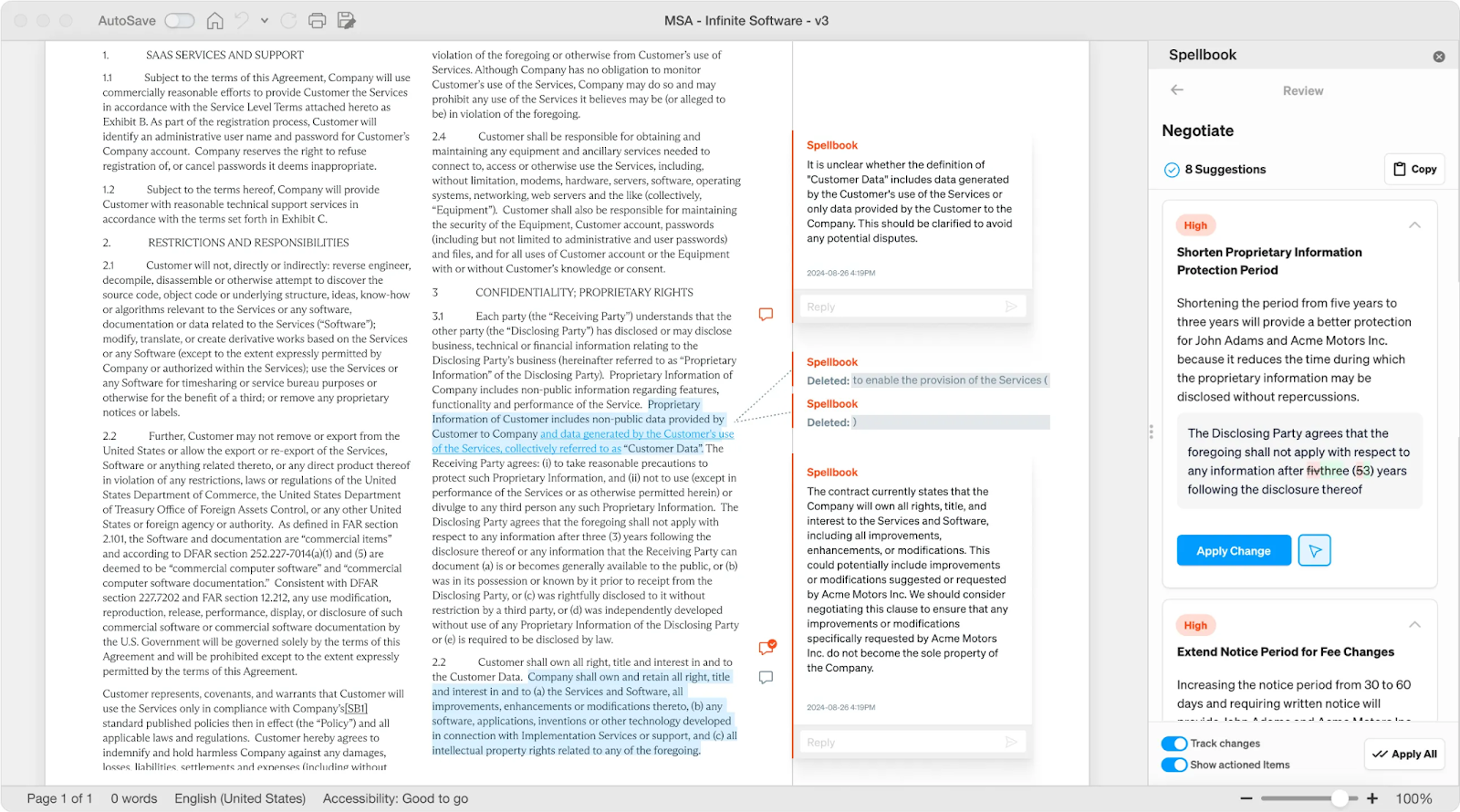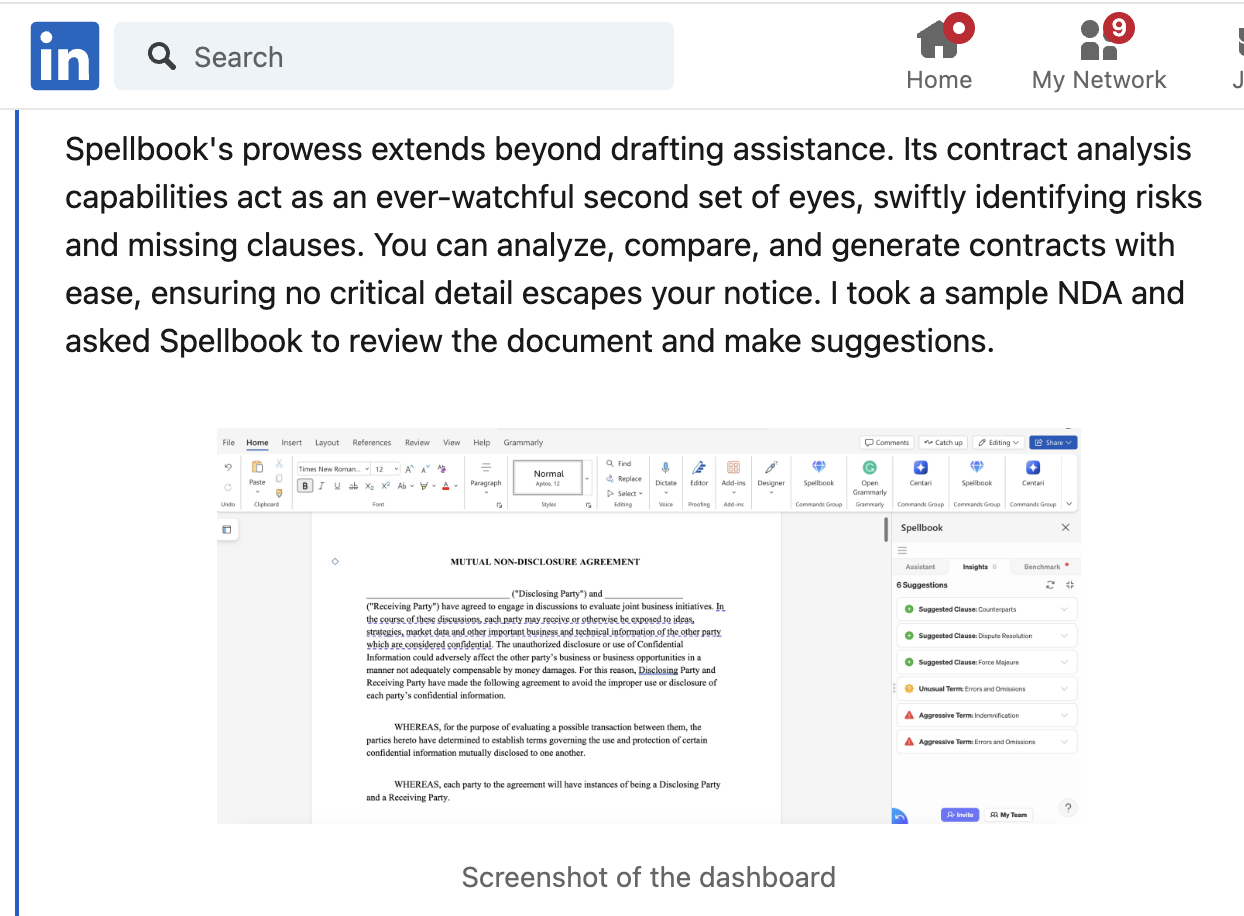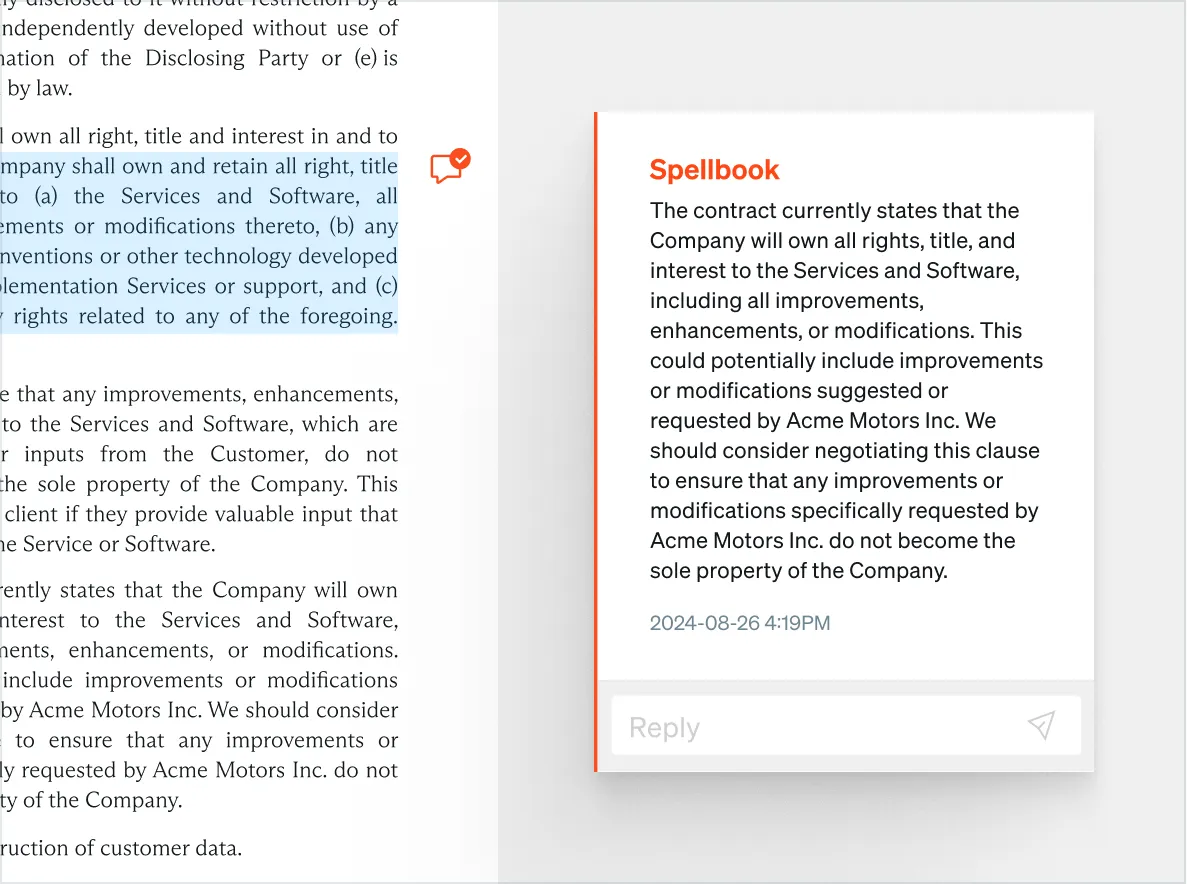
Using AI for Legal Documents: Reading, Writing, and Reviewing

How much time do you spend reviewing contracts and drafting legal documents? What about summarization, clause comparison, and precedent searches? These “busy work” tasks consume far too much attorney time and detract from high-value client work.
But artificial intelligence is quickly changing the legal industry. Imagine having an assistant who can draft and review contracts 80% faster and with extreme accuracy. That’s the power of AI.
First: AI will not replace lawyers, and using AI does not allow lawyers to put their practice on autopilot.
AI makes legal jobs easier and helps lawyers work more productively. It’s an assistant that does the legal drudge work you want to avoid, such as drafting agreements, proofreading documents, and researching.
We’ve seen the transformative power of using AI for legal documents, as more than 3,000 firms now use our legal AI tool, Spellbook. Tools like Spellbook present new opportunities for law firms of all sizes. Imagine how much you could grow your practice if AI handled 80% of your tedious tasks.
Join us as we walk through how you can use AI to free up more time to build client relationships, increase your margins, get more work done, and reduce stress. We’ll also cover our favorite AI tools for legal documents to give you a window into which tools law firms like yours use to speed up their legal work and free more time for higher-value work.
{{cta-surprise-red}}
Why Use AI for Legal Documents?
Using AI for your legal documents can increase productivity and efficiency, while also reducing stress and improving overall well-being. Drafting, writing, and reviewing most legal documents is dull and tedious. You must verify essential clauses, ensure compliance, flag vague language, and benchmark clauses against other contracts in the industry. It’s tedious and repetitive work that wastes valuable time and resources and prevents you from doing more useful work that requires your judgment and expertise.
A study from a British legal software vendor found that attorneys save up to seven hours on average per contract review when assisted by AI-powered software. If you’re a small firm that reviews three contracts per week, that’s 21 hours back in your pocket.
You can spend those 21 hours per week performing higher-level tasks, such as strategizing on cases, meeting with clients, analyzing legal precedents, and maybe, just maybe, getting out of the office before 5 p.m. for a change.
Next, let’s look at how Spellbook can save you time on contract review and drafting directly in MS Word.
Suppose you need to review a 100-page M&A agreement.
Typically, how long would it take someone in your firm to do that? 8 hours? 10 hours, if they’re careful? Spellbook’s algorithms are specifically trained to understand the nuanced language in legal contracts, allowing it to review the agreement in minutes. Then, all you would need to do is spend an hour or so reviewing the results.

In this image, Spellbook analyzes an entire contract and returns suggestions in minutes. It spots unclear language, risks, areas for improvement, and more. Approve or modify its suggestions in a simple-to-use interface without ever leaving Microsoft Word.
While general-purpose AI remains the most common tool used by lawyers, many are now turning to legal-specific AI. In fact, specialized legal AI platforms like Spellbook have seen particularly strong adoption rates among larger law firms.
This is because AI tools trained extensively for the legal industry can offer even more of an efficiency boost. Examples where AI can add value to your practice include:
- Contract Review: Unlike humans who experience fatigue and distractions, AI can consistently and accurately spot inconsistencies, missing clauses, and risky contract terms in seconds. AI-powered tools like Spellbook can suggest improvements such as removing ambiguous language and altering terms to meet industry standards or compliance requirements (e.g., extending a notice period from 30 to 60 days or adding specific liability language).
- Drafting Documents: AI tools can help you draft contracts quickly using pre-designed, customizable contract templates. AI can also learn your preferences from prior contracts you’ve written. With Spellbook, you can create contract playbooks that include ready-made contract templates, compliance frameworks, and your firm’s specific approval workflow. One client did so to reduce his time to draft NDAs by 20%.
- Legal Research: Instead of manually combing through endless case law, Spellbook’s AI quickly searches for and inserts legal precedents or clauses from a database of documents. A built-in Q&A feature allows you to ask specific legal questions and receive AI-generated responses. This can save hours of tedious work while improving accuracy.

This image from a client’s LinkedIn page shows how our NDATriage tool reduces drafting time significantly.
Can AI Contract Review Tools Save Me Time?
We understand that you may have reservations about AI. Maybe you’ve used other AI tools, such as ChatGPT, that haven’t returned the results you’d hoped for.
Spellbook is different. It is explicitly trained for the legal industry. ChatGPT has been trained on the entirety of human knowledge, which gives it a “general education.” As an analogy, Spellbook has been to “law school.”
To get a clearer picture, picture this…
It’s 6:45 p.m., and you’re still at your desk, reviewing a 142-page supplier agreement. Your client wants a full breakdown of risks, unclear clauses, and missing protections. The document is packed with dense legalese, vague language, and 30 pages of appendices that may or may not be relevant. And it’s due tomorrow.
Who has the energy to read every clause, cross-check industry standards and compliance requirements, and make sure the language is airtight after a full day of meetings? It’s a tough situation. If you miss an important detail, it could cost you the client.
Most transactional attorneys have experienced this at some point.
Now, imagine slashing the review time in half. Spellbook can evaluate the agreement in minutes, flag risks, identify missing clauses, and suggest redlined revisions you can accept with one click. You don’t have to read the contract end-to-end. You just approve or reject its suggestions and review key areas it highlights for your attention.
How to Use AI in Legal Documents
Generative AI is still in the early stages of development. We are at the beginning of a revolution, and new and exciting advancements happen almost every day. Legal firms and institutions of all sizes are rushing to get ahead of the curve and gain an advantage.
If you still waste time redlining, benchmarking, and drafting by hand, you’ll lag behind competitors who automate these tasks. If they can re-allocate 20-30 hours saved per week to building client relationships and improving case outcomes, they will attract more clients. Meanwhile, you spend those hours manually drafting and reviewing documents.
Here is an eye-opening statistic from Oleksii Makarov, founder of a marketing firm for lawyers:

AI will not do all the work for you, but if you use it effectively, it will transform your practice substantially. Here are a few ways to use AI in your legal documents:
Legal Writing and Drafting
Writing legal documents is one of the most time-consuming tasks for legal professionals, particularly those in smaller firms that lack the time or resources to hire paralegals or a large team of attorneys.
Legal writing and drafting is where AI can provide the majority of its value. AI enhances your existing writing and drafting process, significantly improving efficiency with a higher level of accuracy than humanly possible. Lawyers’ capabilities cannot compare to the accuracy, stamina, and exacting attention to detail of generative AI.
This is because Spellbook has been trained specifically on legal language. It can recognize contract clauses, proper legal language, and nuanced details because it is trained on thousands of legal documents. When analyzing your legal documents, it references extensive libraries of case law, statutes, legal briefs, contracts, and other legal information. This enables it to automatically draft and suggest relevant clauses and language to be added to your contracts. It’s done in seconds.
Tools like Spellbook also learn from your prior documents to produce new documents such as contracts, memos, emails, and court filings with stunning accuracy. If boring, repetitive tasks hold your lawyers back, AI can free them by completing the tasks for them.
Document Review
Reviewing documents can be a rudimentary and repetitive task that consumes far too much of lawyers’ daily time and effort. It’s not uncommon for law firms to dedicate multiple hours or even days to redlining complex contracts.
Gen AI’s ability to instantly review documents reduces the time from days to an hour or less. AI will automatically review a contract, spot vague or non-compliant language and missing clauses, and recommend improvements. Spellbook can even have redlines appear in your name, so your clients won’t know it’s AI.

A McKinsey report showed that AI-powered contract reviews can cut processing time in half, which, for legal teams, means quicker decisions and better deadline management. That’s efficiency and accuracy rolled into one powerful tool that costs a fraction of what an attorney or legal assistant would cost.
Document Analysis
Another key benefit of using AI in legal documents is that it acts as a second set of eyes, only faster, more thorough, and accurate. The benefits extend beyond time savings because AI also helps you avoid unnecessary risks by minimizing human error.
Let’s say you receive a 200-page merger agreement. Instead of combing through it line by line, AI tools can review the entire document instantly and draft recommendations. In a matter of seconds, Spellbook can identify:
- Potential risks
- Errors and inconsistencies
- Overlooked advantages
It displays recommendations in detailed comments. You can choose which ones to accept and apply. With the bulk approve feature, you can review, edit, and accept multiple changes at once rather than individually addressing dozens of comments.
You get more time to focus on higher-priority work while reducing the chances of negotiation issues. And, Spellbook does it all in less than five minutes.
Summarizing
Summarizing legal documents is a significant challenge for many lawyers. Consider how much time you spend analyzing contracts, case law, and regulations, then condensing your findings into easily digestible summaries.
AI quickly analyzes complex texts, identifies key points, and generates concise summaries. For example, AI-powered tools can scan a 50-page contract and highlight critical clauses, deadlines, dollar amounts, and critical details almost instantly. This saves you hours of manual work. It also saves your critical thinking and patience for higher-value client work, while improving your accuracy, as tired or bored individuals may overlook important details.
Read the article “Using Spellbook: Crafting Email Contract Summaries” to learn more about how our client, Chris Brown, uses Spellbook to summarize contracts in his emails.
Will AI Replace Lawyers?
No. AI will not and cannot replace lawyers. AI is a support tool, not a replacement.
AI is a fascinating and powerful tool that is developing at a rapid pace. It can and will change the legal industry as we know it. It has already brought unprecedented efficiency gains and profit margins.
But AI cannot replicate the nuanced legal judgment, empathy, and strategic thinking human lawyers bring to the table. AI is highly efficient at handling repetitive tasks and processing massive amounts of data in seconds. However, humans prevail in understanding complex legal contexts, crafting persuasive arguments, and fostering client relationships.
Studies and anecdotal evidence suggest that AI is enhancing the performance of lawyers, not sending them to the unemployment office. AI is also giving smaller firms more time to help their clients, which helps level the playing field against larger firms.
Spellbook Sounds Interesting. How Can I Try It?
Spellbook offers a 7-day free trial with no commitment. Get a week of faster, smarter, and more efficient legal work with zero risk. More than 2,600 legal firms are using Spellbook because:
- It integrates directly with Microsoft Word, which makes it easy for less tech-savvy lawyers to use. Just download the application and start drafting, reviewing, and summarizing documents through the same interface you’ve always used.
- It’s downloadable in seconds and ready to use out of the box.
- Start immediately using pre-designed playbooks that contain pre-set rules and clause recommendations for the most common contracts and documents.
- Add redlines directly in Word according to suggestions from the tool.
- It’s far more accurate than ChatGPT or other “non-legal” AI tools. Spellbook is designed specifically for the legal industry and comes with specialized legal knowledge.
- You can use it to write an email to your client that outlines points of concern and explains terms in simple language.
- Spellbook runs on a cost-efficient subscription model that allows you to scale as you grow. Small firms can start on a low subscription and only pay more when they start to win new clients and expand their practice.
Join thousands of other lawyers using the most cutting-edge legal tool available.
Key Takeaways
- AI-powered tools are transforming day-to-day operations in the legal sector by streamlining document drafting, analysis, review, and summarization, reducing errors and saving time.
- While AI tools bring efficiency and precision to legal work, they can never replace human lawyers in areas such as client counseling, courtroom advocacy, and complex legal reasoning.
- Every tool has something to offer, but you must choose one that aligns with your firm’s unique needs.
AI is no longer just a dream. It’s here, and it’s helping lawyers save time, focus more on their clients, and increase billable hours, all while reducing errors and improving their quality of life.
The question now isn’t whether AI will play a role in the legal industry because it already does. The real question is: how will you take advantage of AI?
Thank you for your interest! Our team will reach out to further understand your use case.






